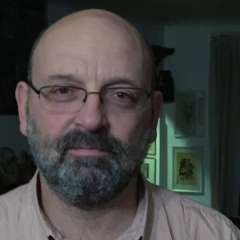Normally, when opera houses put together double bills, efforts are made to somehow link the two acts by either using similar backgrounds or by asking interpreters to play (maybe episodic) roles in both. No such attempts were made for the most recent show produced online by Houston Grand Opera. The two librettos, compositional styles and sets could barely have been further apart, although both were on a certain level related to the current Covid-19 crisis. Furthermore, both recordings were released at the same time, so that one could see them in any order (or jump from one to the other and back if one so fancied).
Bon Appétit! is a very brief single-character opera that composer Lee Hoiby and librettist Mark Shulgasser based on the words and gestures of Julia Child, a TV personality whose cooking lessons were followed by a myriad of housewives in the glorious days of black-and-white television. Her series The French Chef introduced the average American public to fancy European cooking in the 1960s and the opera shows her in the process of baking a chocolate cake “as delicate as a soufflé”. The great mezzo-soprano Jamie Barton seemed to have a lot of fun taking the role up again. In front of cameras placed in close proximity and detailing her expressions, she describes with great verve the amusing competition between a whisk and an electric mixer. Filming actually took place in the real North-Carolina kitchen of bass-baritone-turned-director Ryan McKinny, an alumnus (as is Barton) of the HGO Studios career development program. The role (she described it herself as “a campy presentation”) is more challenging for Barton’s skills as an actress and mime than for her formidably powerful (and at the same time subtle) mezzo. The required range is quite limited here, where she was accompanied by an off-camera pianist (Jonathan Easter) in an unobtrusive soundtrack inspired by those used in TV commercials.
When Patrick Summers, HGO’s artistic and music director, was looking for fresh ideas for a fully-digital opera season, he asked his friend, playwright and librettist James Luigs, to consider an adaptation of Mozart’s rarely-performed one-act farce Der Schauspieldirektor (The Impresario). Written in 1786 for a competition opposing a German-language Singspiel against an Italian opera buffa – Salieri’s Prima la musica e poi le parole – Mozart’s opus describes the tribulations of an impresario trying to cast a show while satirising the ego of singers squabbling about their status.
Luigs renamed the personas and updated the action to 2020. Guided by director E. Loren Meeker, the characters occupy their own separate spaces and interact via Zoom, constantly looking into the camera. The speaking role of Edna Mendenhall, the casting director, was taken by Nova Thomas who – with her accent, mannerisms, and propensity to use bon mots – seemed to evoke Ann Richards, a famous Texan politician, active several decades ago. The role of the more experienced of the two divas, named here Rona Richards (Madame Herz in the original German libretto by Gottlieb Stephanie) was sung by Raven McMillon, a current HGO Studio artist, not entirely secure in her arietta “Da schlägt die Abschiedsstunde”. As her rival, Yolanda Cantrell (Mademoiselle Silberklang), the agile-voiced soprano Nicole Heaston interpreted the rondo, “Bester Jüngling”, with much more confidence.
Appearing late in the story, tenor Frederick Ballentine was an effective Wiley Stonecrop, the competing singers’ agent. Pleasant-sounding bass William Guanbo Su was Bowie Krebs, Mendenhall’s assistant, in a role that required little singing. The half-hour-long performance included additional dialogue, featuring dubious taste rhymes such as “a handkerchief and chiffon peignoir will never make a rat a Renoir”. The Houston Grand Opera’s orchestra was absent from the filmed performance, but Eun Sun Kim conducted. She also headed a long series of Zoom split-screens featuring non-speaking “special appearances” by opera luminaries, from Sir Thomas Allen to Francesca Zambello, while the evening’s protagonists were collectively singing about transcending the current crisis. (The culminating point was a musical illustration of a slogan: “We’re alive, art will thrive”).
Many believe that Covid-related constraints will have a long-lasting effect and radically transform the way performing arts events are produced and perceived. If this evening’s performance was any indication, the results of the change are not (yet) very encouraging.
This performance was reviewed from the Marquee TV video stream


